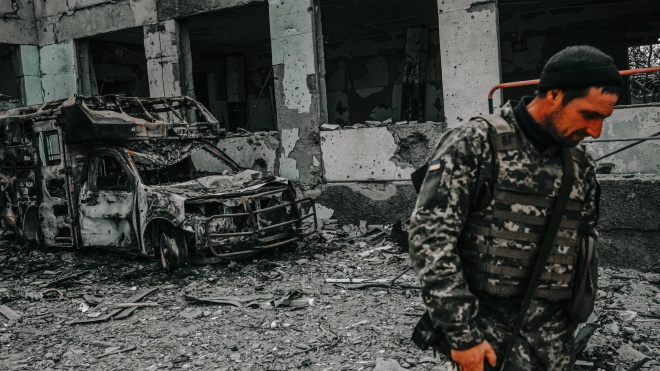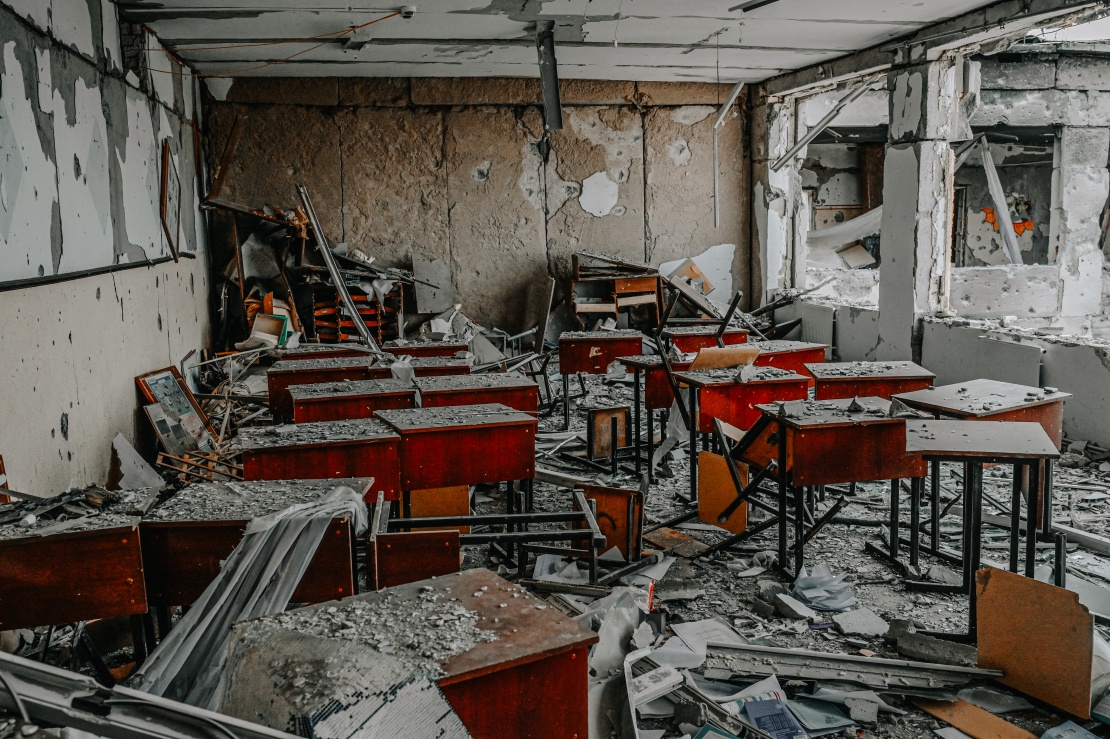Anna Pysanska, 36 years old. She lives in Tavriysk and works as a kindergarten teacher. She has a husband and children aged 8 and 14
A few days [before the invasion], our kindergarten staff was instructed on how to behave during an air alert and where to take children. When I woke up at 5 oʼclock in the morning on February 24 from a loud explosion, I realized that it was not just an explosion of some gas pipe, but a bombing from above. There was a whistling sound — it seemed to me that an old garbage truck was driving and making a lot of noise.
I woke up my husband with the words: "They probably started bombing." He ran to the kitchen and saw bright reflections in the window from the train station. And then he said, "Letʼs wake the kids up quickly." Everyone went to the bathroom together, as itʼs safer there. The little daughterʼs legs started trembling. While sitting, we didnʼt know what was happening. When it became quieter outside, the children went to sleep, but we couldnʼt — I drank sedatives.
Then we learned what we had heard was the bombing of a military unit in the nearby Plodove village. But there were no soldiers there, except for those on duty — the rest were taken somewhere. Already at 9 am [on February 24], tanks from the Crimea entered the city, and a Russian flag was hoisted at the Kakhovka HPP. An acquaintance later told us that a day or two earlier, police officers in Tavriysk department were told that there would be an invasion and whoever wants can go to central Ukraine, and those who stays are better to take their shoulder straps off so that they are not noticed [by the occupants].
[Russian troops] brought a lot of different vehicles, even broken ones. They were even staying in private yards. It was constant buzzing sound in town, because the machinery was moving along the highway all the time.
On February 24, we cleaned the basement of our house, brought in food, a carry-on, and an electric kettle, not yet realizing that there might be no electricity. Constantly sitting in the cold basement, we only went out to wash quickly and cook a small portion soup for the children. We slept dressed, four on one sofa. Of course, we had our documents with us, and axes and hammers were laid out in the basement and in the toilet so that we could get out if our house would be ruined.
A destroyed class at a school hit by Russian missiles in the village of Zelenyi Hai in southern Ukraine between Kherson and Mykolayiv, less than 5 km from the front line. April 1, 2022.
Getty Images / «Babel'»
From the first day, the ATB was full of people — the shelves were already empty. We ran there and bought everything that was left: instant noodles, crackers, bagels that fell over the counter. All this could be eaten in the basement without preparation. When we left the town, I remember that boiled sausage cost UAH 500 per kilogram.
The bread ran out sharply. But one day a small truck with bread arrived, and I managed to buy eight loaves. Three of them I gave to my parents and five left to us. I was very worried that there would be no bread again, and I made the rusks so that there was always something to eat.
Interruptions in supply of groceries and other goods began. In Plodove village, people sat in basements for two weeks. They had neither electricity nor water. A friend lived there and told me: “You canʼt imagine what itʼs like when there is no water. When you collect water from a defrosting refrigerator to make some soup for your baby.”
There were problems with money, because the shops only accepted cash. And you canʼt withdraw it from the ATM as there was no supply of cash [from the free part of Ukraine]. We agreed with the store owner as follows: the money was transferred to his card, and he gave us cash with 5-7 percent commission. Fortunately, then I was given part of the salary. The husband was to be paid on March 7, but the employer paid him in late February. So we had money.
There were huge crowds in pharmacies — in just three days all the medicine were sold out, and the only two pharmacies in town closed. But on the first day I managed to stand in long lines in the first days. We set up a self-help group chat on Viber, where people could give each other one or two pills of some medicine. So the locals tried to help each other.
People watched television for days then. When I became too worried, I started watching it only once a day just to catch up on the news. We all expected that we were about to be liberated, but Russian equipment and soldiers just kept coming. A lot of them were staying in the woods. I compare them to lice. Itʼs as if there are so many of them on their heads that they even jump out.
I didnʼt go anywhere for a month, but because we needed medicine, we had to go to the neighboring Nova Kakhovka city. The buses routes were resumed by then, but they had to pass checkpoints: [the occupiers] took out the men [from the buses], and checked their documents. Locals talked about Russians differently. But we saw with our own eyes how many times they confiscated cars: they just dropped people off them got into cars themselves.
My husband and I went out to protest rally in Tavriysk. Itʼs very scary when you stand in line to buy bread, and they ride in armored personnel carriers and set their weapons on you. It was generally very scary. We started thinking about how to leave. Were afraid that they would shoot people. There were more and more checkpoints on the way to Kherson, and the bridge on the hydroelectric power plant was closed.
A man with a dog at Zelenyi Haiʼs school.
Getty Images / «Babel'»
The last straw was a piece of paper from the "military commandantʼs office". It was a letter in Viber with the seal with a two-headed chicken with an appeal to the residents of Tavriysk and neighboring towns and villages. It said men between the ages of 18 and 35 would be drafted into the Russian army. And my husband said, "How should it be? They will hold the barrel near my temple, and I will be disguised to stand and shoot at my own [Ukrainian] soldiers? We have to get out of here."
We were looking for different opportunities to leave. We had saved a modest sum of money — $3 thousand, we wanted to buy a car. It was possible to go through the Crimea, Russia, Lithuania and Latvia to Poland. But we didnʼt go via Russian territory, because we were afraid we would not be able to enter Ukraine later.
Fortunately, our relatives from Kherson helped us to leave. Their acquaintance agreed to bring us to Kherson for 5 thousand hryvnias.
There were 18 checkpoints on the road. On each one [the Russians] checked our luggage, driverʼs and husbandʼs documents and smartphones. But they were, surprisingly, very polite. The driver warned us to delete all the photos, Viber and Facebook apps. We were afraid to say anything suspicious, so the driver always spoke for us. Along the way we saw burned and broken convoys of equipment, Antonov Bridge with holes in it.
We also had to be transported from Kherson by carriers, and we were picked up earlier than others in the queue. To get from Kherson to Bashtanka we paid 16 thousand hryvnias — 4 thousand hryvnias per person. From Bashtanka to Odesa they took another 8,000 hryvnias from us — 2,000 hryvnias per person. That is, to get out of the occupation, we had to pay 29 thousand hryvnias. It is good that we had a supply of dollars, despite the fact that we are not a rich family.
I remember my feelings at the first Ukrainian checkpoint — I felt free. It was very scary in Tavriysk, when you canʼt go anywhere, you canʼt let the children out. We sat in apartments and watched in windows whatʼs happening. In the morning you run for bread or milk, and then at noon the city dies out. When I slept and the wind blew, it seemed to me that it was sound of rockets flying.
When we left Bashtanka, we approached one of the Ukrainian checkpoints. I wanted to give cookies to the soldier, because we were so happy to get out of there [of occupation]. I cried so much. There was a feeling: “Thank God that Iʼm in my homeland, that I am no longer in the occupied territory. That this fear is gone. Iʼm free, Iʼm not a slave." Then we stopped at the gas station, and there were different products [in the shop at the gas station], and people walked freely. It was so wild for me.
In Odesa, we learned that an evacuation train was going to Chernivtsi every other day. There were a lot of people, but we told the leader that we were from Kherson Oblast, and they gave us a compartment. And we traveled in a compartment for the first time in our lives.
Of course, we are glad that we are already safe, but Iʼm very worried for my mom and dad who stayed in Tavriysk. The Russian military is already going from house to house. And my parents are old: dad after a stroke, mom has a weak heart, and she takes care of the dad.
It is very scary in the occupation. When you know that our army is near, you still have hope. And in other cases you are nobody. They [the Russian soldiers] have now been ordered not to touch civilians, but we donʼt know what they will be ordered to do tomorrow. However, they still took away cars, dragged women and beat men.
Translated from Ukrainian by Anton Semyzhenko.
Support Babel:🔸donate in hryvnia 🔸in cryptocurrency 🔸via PayPal: [email protected].
Destroyed Jesus figure at the school in the Zelenyi Hai village.
Getty Images / «Babel'»

